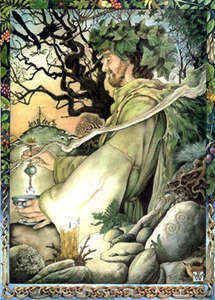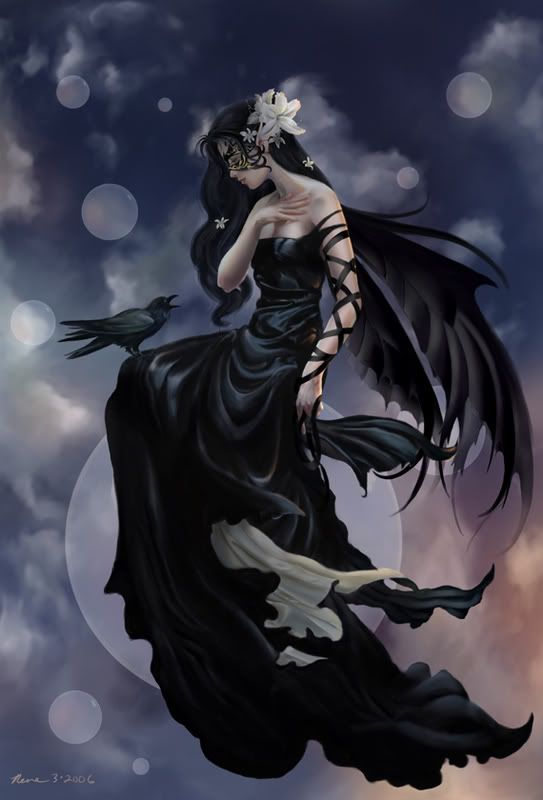Post by wren on Oct 31, 2006 11:28:30 GMT -5
Dark Night of the Soul is a term used to describe a specific phase in a person's spiritual life. It is used as a metaphor to describe the experience of loneliness and desolation that can occur during psychic or spiritual growth.
The term and metaphysicality of the phrase "dark night of the soul" are taken from the writings of the Spanish poet and Roman Catholic mystic Saint John of the Cross, a Carmelite priest in the 16th century. Dark Night of the Soul is the name of both a poem, and a commentary on that poem, and are among the Carmelite priest's most famous writings. They tell of his mystic development and the stages he went through on his quest for holiness.
The "dark night" could generally be described as a letting go of our ego's hold on the psyche, making room for change that can bring about a complete transformation of a person's way of defining his/her self and their relationship to God. The interim period can be frightening, hence the perceived "darkness". In the Christian tradition, during the "dark night" one who has developed a strong prayer life and consistent devotion to God suddenly finds traditional prayer extremely difficult and unrewarding for an extended period of time. The individual may feel as though God has suddenly abandoned them, or that their prayer life has collapsed.
Rather than being a negative event, the dark night is believed by mystics and others to be a blessing in disguise where the individual is trained to grow from vocal and mental prayer, to a deeper contemplative prayer of the soul. Particularly in Christianity, it is seen as a severe test of one's faith. The Dark Night comes in two phases: a first "Night of the Senses," and a second "Night of the Spirit."
In shamanistic training, the 'dark night' is the cocoon from which we emerge reborn. It is the necessary darkness in order to test and seek visions, guidance and growth. It can be something we actively seek, like a vision quest, or an unexpected and unwanted upheaval in our carefully laid plans, such as a life-threatening illness, death of a loved one or a broken heart.
Whatever the cause, the effect is initiation, transformation and rebirth. We can experience a 'dark night of the soul' at any time in our lives and usually do so more than once. What we make of it, what we take from it and what we become depends completely on just how much we open our hearts and minds to the darkness in order to learn from it.
This is the same intense sorrow that is written of in the 'Cauldron of Poesy' (a thread under the Celtic Reconstructionist boards). This intense sorrow, coupled with intense joy, turns the Cauldrons within us and inspire us to new heights of creativity and service to the Tribe. We become lightning rods for 'imbas' or divine inspiration.
The term and metaphysicality of the phrase "dark night of the soul" are taken from the writings of the Spanish poet and Roman Catholic mystic Saint John of the Cross, a Carmelite priest in the 16th century. Dark Night of the Soul is the name of both a poem, and a commentary on that poem, and are among the Carmelite priest's most famous writings. They tell of his mystic development and the stages he went through on his quest for holiness.
The "dark night" could generally be described as a letting go of our ego's hold on the psyche, making room for change that can bring about a complete transformation of a person's way of defining his/her self and their relationship to God. The interim period can be frightening, hence the perceived "darkness". In the Christian tradition, during the "dark night" one who has developed a strong prayer life and consistent devotion to God suddenly finds traditional prayer extremely difficult and unrewarding for an extended period of time. The individual may feel as though God has suddenly abandoned them, or that their prayer life has collapsed.
Rather than being a negative event, the dark night is believed by mystics and others to be a blessing in disguise where the individual is trained to grow from vocal and mental prayer, to a deeper contemplative prayer of the soul. Particularly in Christianity, it is seen as a severe test of one's faith. The Dark Night comes in two phases: a first "Night of the Senses," and a second "Night of the Spirit."
In shamanistic training, the 'dark night' is the cocoon from which we emerge reborn. It is the necessary darkness in order to test and seek visions, guidance and growth. It can be something we actively seek, like a vision quest, or an unexpected and unwanted upheaval in our carefully laid plans, such as a life-threatening illness, death of a loved one or a broken heart.
Whatever the cause, the effect is initiation, transformation and rebirth. We can experience a 'dark night of the soul' at any time in our lives and usually do so more than once. What we make of it, what we take from it and what we become depends completely on just how much we open our hearts and minds to the darkness in order to learn from it.
This is the same intense sorrow that is written of in the 'Cauldron of Poesy' (a thread under the Celtic Reconstructionist boards). This intense sorrow, coupled with intense joy, turns the Cauldrons within us and inspire us to new heights of creativity and service to the Tribe. We become lightning rods for 'imbas' or divine inspiration.











